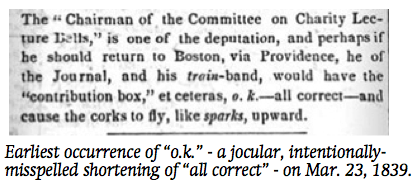By Dennis Baron
 By rights, OK should not have become the world’s most popular word. It was first used as a joke in the Boston Morning Post on March 23, 1839, a shortening of the phrase “oll korrect,” itself an incorrect spelling of “all correct.” The joke should have run its course, and OK should have been forgotten, just like we forgot the other initialisms appearing in newspapers at the time, such as O.F.M, ‘Our First Men,’ A.R., ‘all right,’ O.W., ‘oll wright,’ K.G., ‘know good,’ and K.Y., ‘know yuse.’ Instead, here we are celebrating OK’s 172nd birthday, wondering why the word became a lexical universal instead of a one day wonder.
By rights, OK should not have become the world’s most popular word. It was first used as a joke in the Boston Morning Post on March 23, 1839, a shortening of the phrase “oll korrect,” itself an incorrect spelling of “all correct.” The joke should have run its course, and OK should have been forgotten, just like we forgot the other initialisms appearing in newspapers at the time, such as O.F.M, ‘Our First Men,’ A.R., ‘all right,’ O.W., ‘oll wright,’ K.G., ‘know good,’ and K.Y., ‘know yuse.’ Instead, here we are celebrating OK’s 172nd birthday, wondering why the word became a lexical universal instead of a one day wonder.
Most of the “abracadabraisms” popular among journalists in 1839 are long gone, but OK stuck around. It didn’t go viral right away, perhaps because the first virus wouldn’t be discovered for another 60 years, but unlike A.R. and K.Y., OK managed to spread beyond comic articles in newspapers, to become a word on almost everybody’s lips. For that to happen, we had to forget what OK originally meant, a jokey informal word indicating approval, and then we had to repurpose it to mean almost anything, or in some cases, almost nothing at all.
Here’s that first OK, discovered almost 50 years ago by the linguist Alan Walker Read:
he of the Journal . . . would have the “contribution box,” et ceteras, o.k.—all correct—and cause the corks to fly, like sparks, upward. [“He” is the editor of the rival Providence paper, and the subject of the article, the shenanigans of rowdy journalists and their friends, is so trivial that explaining it in no way explains OK’s success.]
The fact that the writer, the Post’s editor Charles Gordon Greene, defines OK as “all correct” confirms its novelty—readers wouldn’t be expected to know what it meant. But because readers were already used to jokey initialisms, Greene expected them to connect “oll korrect” and “all correct” on their own. He didn’t have to ask, “OK, Get it?” or add a final “Haha” to the message.
But why did OK have more staying power than yesterday’s newspaper? One thing that kept OK going after its March 23, 1839 sell-by date was its adoption by the 1940 re-election campaign of Pres. Martin Van Buren. Van Buren, born in Kinderhook, New York, was known as Old Kinderhook, and his political machine operated out of New York’s O.K. (Old Kinderhook) Democratic Club. The coincidence between “Old Kinderhook” and “oll korrect” proved a sloganeer’s dream, as this notice for a political rally illustrates:
The Democratic O.K. Club are hereby ordered to meet at the House of Jacob Colvin. [1840, Oxford English Dictionary, known more commonly by the initialism OED]
That campaign may have helped OK more than it helped Van Buren, who was definitely not OK: he was blamed for the financial crisis of 1837 and roundly trounced in the election by William Henry Harrison. Harrison himself wasn’t so OK: he died from pneumonia a month after giving a 2-hour inaugural address in the rain, but OK got national exposure, and it was soon tapped as one of many shorthand expressions (like gmlet for ‘give my love to’) serving the new telegraph, the “Victorian internet” that began spre


